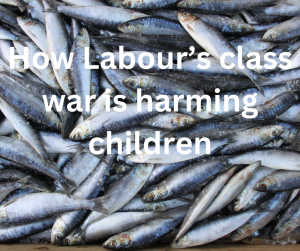We are already seeing the devastating results of Labour’s class war
 Labour’s war on private schools is already beginning to backfire and disadvantage all students – rich and poor.
Labour’s war on private schools is already beginning to backfire and disadvantage all students – rich and poor.
Putting ideology above pragmatism is madness and proves that this government does not care about our children’s education.
Its hatred of the ‘rich’ has led to it making private school fees taxable at the standard rate of VAT of 20% from January. Previously they were exempt.
Many doubt whether this will raise any extra money at all – but that was not the object of the policy.
The policy was to please Labour’s leftwing base and punish those who have the temerity to send their children to private schools.
But the private school sector is not typified by Eton and Harrow as Labour seems to think – they are exceptions.
Many are specialist schools and parents often work two or three jobs, scrimp, save and go without in order to send their children to them.
The new policy is already seeing a change in behaviour – and everyone is suffering, both state and private schools and all their students.
There were 10,000 fewer pupils registered for private schools this term because their parents couldn’t afford the hike. And more will follow, especially with taxes on ‘working people’ due to rise in the Budget.
This means the numbers of children in our already-bulging state schools will grow.
Class sizes are increasing and teaching a group of 30 or more is extremely difficult – I did it for many years.
If it is a mixed-ability class in the secondary system you literally have to prepare three lessons.
First, there is the core teaching points you have to get across to the whole class – effectively teaching to the middle.
Secondly, there needs to be special material prepared for children who will surpass what you have taught in the core content.
Thirdly, there is a requirement to support the children who will be struggling with the core content.
This is a very difficult balancing act. It can also be complicated by children who are poorly behaved or not so cooperative.
For many teachers, this is their daily experience and the new influx of children from the private school system will make it worse as more classes climb above 30.
Primary schools largely operate around mixed-ability teaching too so the same pressures will be experienced.
The influx of children from private schools is adding further pressure. They come from different environments and have possibly been taught different topics and to use different methods.
They may well be significantly in front of their new state school peers. For some subjects such as maths and English children are placed in different sets according to ability and there will now be larger classes in the higher sets.
Also, the pastoral systems in state schools are likely to be stretched with the influx of children from wildly different educational environments.
Recruiting the mythical 6,000-plus teachers is unlikely to happen and it certainly won’t happen overnight, so these pressures are going to be felt right away.
With a huge spike in the population due to mass immigration many state schools struggle to cope and their facilities are creaking already.
Adding more pupils will exacerbate this problem.
Private schools will also suffer – although maybe not the richest ones because their pupils’ parents are likely to be able to absorb the increase.
And due to a careless loophole in the legislation private schools will be able to recover historic VAT they paid on capital expenditure over the past 10 years. This will benefit the richest ones most. Eton is set to benefit by £4.5m
However, for most private schools the changes will negatively impact them, and their children.
Some have already closed altogether, and others will follow.
One high-performing girls’ school I know of has had its new intake reduced from 60 to 40 this term – a third lower.
This will mean teacher redundancies and subjects will be taught by non-specialists.
Hardworking parents who have struggled to pay fees could find themselves in financial difficulty if they decide to continue.
The government could have brought in the changes gradually, allowing private school students to complete the exams they are working on before moving to the state sector.
But they don’t care about the private school students, they are motivated only by hatred and envy.
They could have prepared the state system for more pupils before introducing the VAT changes, but they were so excited about ‘punishing’ the ‘rich’ that they couldn’t wait.
Any money raised by the VAT hike will be eaten up by the increased numbers of state school applications – so far it is 10,000 children and climbing.
It costs around £7,000 annually per pupil in the state system.
Just for starters, this adds up to a cool £70 million already that will need to be found by the government.
This will rise much more as the exodus from the private system continues.
The policy is born out of class hatred – a prejudice that is fine, apparently.
The sensible thing would be to encourage more people to send their children to private schools so there is extra capacity and resources in the state sector.
There is no reason why state schools cannot achieve exam results as good as private schools – it has been proven by Katharine Birbalsingh at her Michaela Community School.
But she uses methods that the progressive left despise. And that is another story…
ends